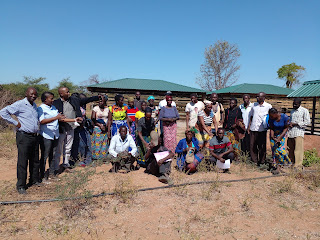By HAPPY MULOLANI
MORE than 80% of smallholder farmers in Africa are engaged in agriculture. These farmers’ production capacities have been low due to the use of hand hoe.
In Zambia, more than 60% of smallholders use the hand hoe to cultivate their land resulting in low yields, thus the use of the hand hoe has resulted in limited production capacities.
To overcome this challenge, Government has reiterated the need to ensure smallholder farmers access modern mechanised equipment in order to boost their production capacities.
Government with support from the Enhanced Smallholder Agribusiness Promotion Programme (E-SAPP) has partnered with various Micro and Small Medium Enterprise (MSMEs) through the Matching Grant Facility (MGF) for enterprises such as Out-Grower schemes.
One such SME is Augustine Mweenda Agro Centre (AMAC), located in Chibombo district in Central province of Zambia. It is providing mechanization services and bulking facility to over 290 smallholder farmers of the district, which is being facilitated through provision of agricultural inputs and mechanisation as a way of increasing production.
As per E-SAPP guidelines, AMAC contributed 40% cash towards their sub-project. To improve the production capacity, Augustine Mweenda Agro Centre is providing mechanised services to smallholder farmers its working with after the financing support. This is based on the understanding that mechanisation improves the efficiency of production and multiplies the crop yields even during periods of climatic shocks.
Mechanisation also helps farmers prepare their fields early and reach the crop depth and also enhance chances of crop survival whenever long dry spells occur.
Despite the farming community being sensitized about the benefits of mechanised farming; farmers did not have the capacity to mechanise due to the high cost of hiring equipment. They still relied on the traditional methods of cultivation - hand hoe and animal draft power (oxen).
This presented the opportunity to some farmers in Chibombo district who lacked access to modern tools for farming for many years, to collaborate with AMAC in order to boost their production capacities.
“I have been using hand-hoe since I started farming in this area in 2009. To cultivate one hectare with a hand-hoe, I will take one week or more whilst my experience with hiring a tractor it takes less than a week, normally two days or so,” a smallholder farmer in Chibombo, Collins Tembo revealed.
Mr Tembo also said after trainings and accessing a tractor under AMAC, he is now able to produce 56 bags of 50kilogramme of soya bean from one hectare compared to 20 bags by 50kilogram previously in one hectare. He attributes this to adoption and application of new practices imparted during trainings, which also thwarts soil erosion and returns soil fertility for successive seasons.
One of the beneficiary, a soya bean
farmer, Agnes Ngwenya, said previously she used to produce only 15 bags of soya
bean from one hectare but after undergoing trainings and material support by AMAC,
her yield has improved from 15 to 49 bags from the same hectare, noting that
the knowledge and skills rendered were useful.
AMAC Director, Augustine Mweenda
says collaborating with the Enhanced Smallholder Agribusiness Promotion Programme
(E-SAPP) has enabled them to assist farmers in uplifting their livelihoods,
which has been facilitated through the provision of mechanised services coupled
with technical and material assistance to farmers in the district.
But one of the concerns of this mechanisation service is, its sustainability and affordability in the long-term, as has been the trend in previous years where modern mechanisation equipment is provided but when programmes phase-out, it becomes a white elephant.
“As part of sustainability efforts, we are providing the tractor at a lower cost of K400 per hectare as opposed to K800 which is being charged by most players on the market. It’s basically a subsidised cost which enables more smallholders access the tractor and also have a larger hectarge, which means the smallholders production capacities will be boosted,” Mr Mweenda said.
The idea of offering a subsidised rate to smallholder farmers has foreseen benefits which include; providing an affordable service to smallholder farmers, increasing hectarage area of their commodities of focus and increase volumes. And to promote mechanised farming and use of latest technologies to achieve high crop yields amid the adverse weather conditions.
Consideration needs to be taken into account if provision of mechanisation services to smallholder farmers is to be sustained through contributing funds in their cooperatives or farmer groups to maintain the tractor and also hire services at affordable prices. Equally, stakeholders need to provide support to upscale farmers’ agricultural production through mechanisation, as this will also ensure agricultural diversification of the agriculture sector and contribute to the country’s gross domestic product. Eventually, the benefits of offering mechanisation services will offer wealth creation and value addition.
AMAC’s efforts are meant to assist farmers have access to mechanise their farming system and adopt smart agriculture practices to reduce effects of climate change and increase their yields. Mechanising the farming system, diversify and adopt climate smart practices will enable them achieve high crop yields in view of climate change.

